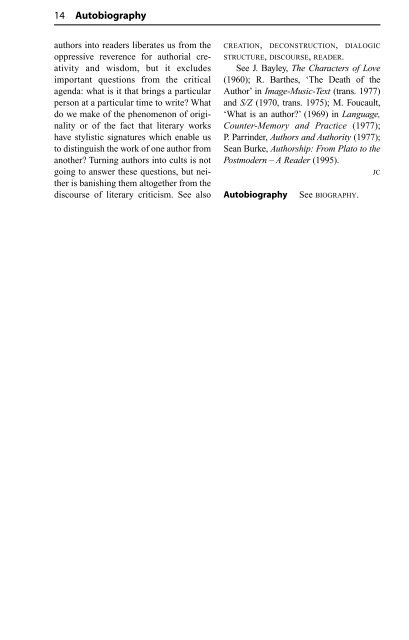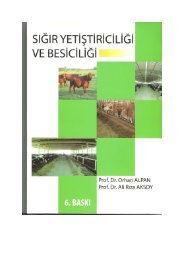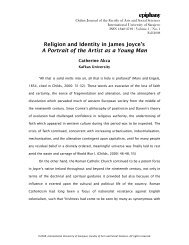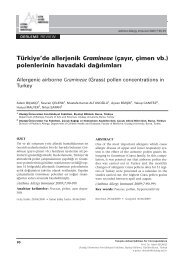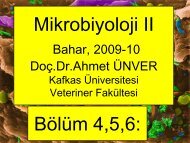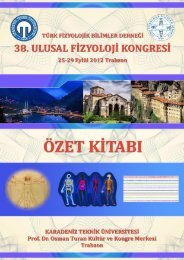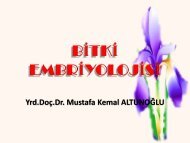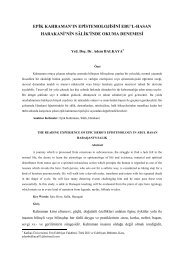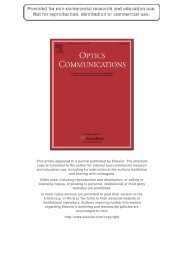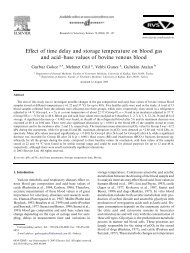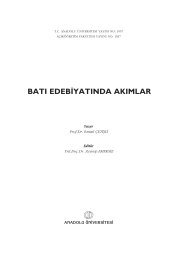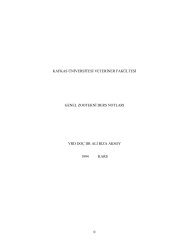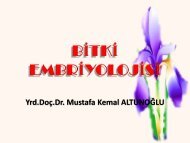- Page 2 and 3: The Routledge Dictionary of Literar
- Page 4 and 5: The Routledge Dictionary of Literar
- Page 6: To Claire Philpott, with thanks
- Page 9 and 10: Note on the style of references Cro
- Page 11 and 12: x List of terms Dénouement 52 Devi
- Page 13 and 14: xii List of terms Scriptible 212 Se
- Page 15 and 16: 2 Action See Martin Esslin, The The
- Page 17 and 18: 4 Affective fallacy appreciation, a
- Page 19 and 20: 6 Ambiguity or beyond the Self as t
- Page 21 and 22: 8 Analysis anything else; one can r
- Page 23 and 24: 10 Aporia Final End as an image of
- Page 25: 12 Author closely related in emotio
- Page 29 and 30: 16 Baroque treating ‘collected’
- Page 31 and 32: 18 Belief Belief Since I. A. Richar
- Page 33 and 34: 20 Biography of self-realization un
- Page 35 and 36: 22 Burlesque See Leon Edel, Literar
- Page 37 and 38: 24 Character characters are not sim
- Page 39 and 40: 26 Chorus The result is a remarkabl
- Page 41 and 42: 28 Closure of English Classicism (1
- Page 43 and 44: 30 Comparative literature granted w
- Page 45 and 46: 32 Concrete poetry As these example
- Page 47 and 48: 34 Contradiction What should be sub
- Page 49 and 50: 36 Couplet the technical convention
- Page 51 and 52: 38 Criticism device or convention m
- Page 53 and 54: 40 Critique E. D. Hirsch, Jr, Valid
- Page 55 and 56: 42 Cultural criticism Arnoldian sen
- Page 57 and 58: 44 Culture of human nature, transce
- Page 59 and 60: 46 Cybercriticism studies has also
- Page 61 and 62: Dada Received its enigmatic name in
- Page 63 and 64: 50 Deconstruction concept nor origi
- Page 65 and 66: 52 Defamiliarization decorum but al
- Page 67 and 68: 54 Diction Diction Aristotle’s lo
- Page 69 and 70: 56 Differend creatures, each posses
- Page 71 and 72: 58 Discourse boundaries of various
- Page 73 and 74: 60 Discourse in a certain regularit
- Page 75 and 76: 62 Dissociation of sensibility expe
- Page 77 and 78:
64 Dramatic irony quite other than
- Page 79 and 80:
66 Écriture when addressed to mate
- Page 81 and 82:
68 Emblem a style, as well as a poe
- Page 83 and 84:
70 Epic theatre The point about epi
- Page 85 and 86:
72 Epistle It has created a new aes
- Page 87 and 88:
74 Ethical criticism of different r
- Page 89 and 90:
76 Eurocentrism becomes part of ‘
- Page 91 and 92:
78 Existentialism granted. Descript
- Page 93 and 94:
80 Explication Kaufman (ed.), Exist
- Page 95 and 96:
Fable A short moral tale, in verse
- Page 97 and 98:
84 Farce the protagonist sets up un
- Page 99 and 100:
86 Feminist criticism feminism whic
- Page 101 and 102:
88 Fiction Fiction A complex term w
- Page 103 and 104:
90 Figure fabulation, which purport
- Page 105 and 106:
92 Form distinction than a technica
- Page 107 and 108:
94 Free verse perception is an aest
- Page 109 and 110:
Gender Frequently still used as a s
- Page 111 and 112:
98 Globalization it is removed to t
- Page 113 and 114:
100 Gothic the whole sub-world of t
- Page 115 and 116:
Hegemony The term hegemony as defin
- Page 117 and 118:
104 Hermeneutics This may sound sus
- Page 119 and 120:
106 Hero and portents. But when the
- Page 121 and 122:
108 Historicism merges with the nat
- Page 123 and 124:
110 Homophony Homophony See AMBIGUI
- Page 125 and 126:
112 Hybridity from reality (conside
- Page 127 and 128:
Ideology Traditionally, the word id
- Page 129 and 130:
116 Imagination flesh. What starts
- Page 131 and 132:
118 Imagism R. L. Brett, Fancy and
- Page 133 and 134:
120 Imitation Imitation The first r
- Page 135 and 136:
122 Intertextuality novel knows it
- Page 137 and 138:
124 Irony Verbal irony usually oper
- Page 139 and 140:
Lament See ELEGY. Language A concep
- Page 141 and 142:
128 Lexis structure, and ideologica
- Page 143 and 144:
130 Literature to action (so propag
- Page 145 and 146:
132 Lyric logos exists independentl
- Page 147 and 148:
Magical (magic) realism The term ma
- Page 149 and 150:
136 Manners poets are the archetypa
- Page 151 and 152:
138 Mask unproblematic term - as it
- Page 153 and 154:
140 Metaphysical thesis, argued for
- Page 155 and 156:
142 Metre typically, twelve define
- Page 157 and 158:
144 Mock-epic believed to have/be e
- Page 159 and 160:
146 Monody See M. Bradbury and J. M
- Page 161 and 162:
Narrative The recounting of a serie
- Page 163 and 164:
150 Narrative structure Introductio
- Page 165 and 166:
152 Nationalism and ethnicity studi
- Page 167 and 168:
154 Naturalism the Third World. Eth
- Page 169 and 170:
156 New criticism scientific termin
- Page 171 and 172:
158 Novel and that the term itself
- Page 173 and 174:
Objective correlative Popularized b
- Page 175 and 176:
162 Onomatopoeia Ode (1960); Robert
- Page 177 and 178:
164 Originality See Ngugi wa Thiong
- Page 179 and 180:
Paradox An apparently selfcontradic
- Page 181 and 182:
168 Pastoral a mosaic of quotations
- Page 183 and 184:
170 Peripeteia to gender, and relat
- Page 185 and 186:
172 Phenomenology the same as diffe
- Page 187 and 188:
174 Picaresque criticism but there
- Page 189 and 190:
176 Pleasure Platonism is the poets
- Page 191 and 192:
178 Pluralism necessary order of a
- Page 193 and 194:
180 Poetics a naïve reader or list
- Page 195 and 196:
182 Point of view a ‘poem’, and
- Page 197 and 198:
184 Postcolonialism ‘the West’
- Page 199 and 200:
186 Postmodernism championed an art
- Page 201 and 202:
188 Practical criticism Robert Youn
- Page 203 and 204:
190 Protagonist inevitability of co
- Page 205 and 206:
192 Psychology and psychoanalysis c
- Page 207 and 208:
194 Psychology and psychoanalysis a
- Page 209 and 210:
Reader Classical theory, seeing lit
- Page 211 and 212:
198 Realism Though Fish himself did
- Page 213 and 214:
200 Reason longed for the anonymity
- Page 215 and 216:
202 Representation were more concer
- Page 217 and 218:
204 Rhetoric See Antonio Gramsci, S
- Page 219 and 220:
206 Rhizome Schizophrenia (1980), a
- Page 221 and 222:
208 Rhythm which the aa pair outfla
- Page 223 and 224:
210 Romanticism this problem prepar
- Page 225 and 226:
212 Scansion use a variety of devic
- Page 227 and 228:
214 Sensibility strives to extend a
- Page 229 and 230:
216 Sexuality picture. This whole a
- Page 231 and 232:
218 Sign either the ‘whimper’ s
- Page 233 and 234:
220 Skaz Nature (1884) of the chara
- Page 235 and 236:
222 Sonnet The typical soliloquy is
- Page 237 and 238:
224 Speech simplified yet more radi
- Page 239 and 240:
226 Structuralism three most import
- Page 241 and 242:
228 Style they are also likely to e
- Page 243 and 244:
230 Subaltern Difference (1999). Re
- Page 245 and 246:
232 Suspension of disbelief inspire
- Page 247 and 248:
234 Syntax space-time ordering of a
- Page 249 and 250:
Taste See CLASSIC, CULTURE, EVALUAT
- Page 251 and 252:
238 Texture depend on the ambiguity
- Page 253 and 254:
240 Threnody (cf. PLOT). The thesis
- Page 255 and 256:
242 Tragedy plays. It is the unbear
- Page 257 and 258:
244 Travesty Translator’, in Illu
- Page 259 and 260:
246 Undecidability become alienated
- Page 261 and 262:
Value See EVALUATION, REFUNCTIONING
- Page 263 and 264:
250 Voice during the seventeenth ce
- Page 265 and 266:
252 Womanist a witty writer. His Ra
- Page 267 and 268:
New and revising contributors JA Ja
- Page 269 and 270:
Semiotics: The Basics Daniel Chandl
- Page 271 and 272:
The Routledge Companion to Feminism
- Page 273:
eBooks - at www.eBookstore.tandf.co


